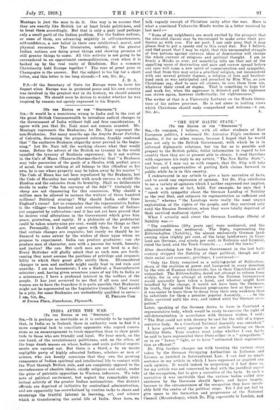[To THE EDITOR OF THE " SPECTATOR."1 SIR, — It would be
a monstrous wrong to India and to the rest of the great British Commonwealth to introduce radical changes in the Government of India without full and free consideration. I agree with you that Dr. Nair must not remain muzzled. Mr. Montagu represents the Brahmins; let Dr. Nair represent the non-Brahmins. Not many months ago the Amyita Bazar Pafrika, of Calcutta, discussing the proposed reforms, frankly confessed that " the exclusive Brahmin oligarchy must prevail in the begin- ning." Let Dr. Nair tell the working classes what that would mean. Before the advent of the British no tyranny in the world equalled the tyranny of Brahmin. supremacy. Is it not written in the CaJe of Mann (Manava-dharma-shastra) that "a Brahmin may take possession of the goods of a Shudra with perfect pew...a of mind, for sinoe nothing at all belongs to this (Shudra) as his own, he is one whose property may be taken away by his master "? The Code of Menu has not been repudiated by the Brahmin, but the Code of Macaulay has sought with much success to shield the Shudras and the outcastes from its brutality. Shall we deliberately decide to make "the fox surveyor of the fold"? Certainly the sheep are not clamouring for this concession. Why should a million men be allowed to menace the welfare of three hundred millions? Political strategy? Why should India suffer from England's curse? Let us remember that the representative Indian is the villager—two hundred and seventeen millions of Indians are supported by cultivation—and it has not yet been proved that he desires vital alterations in the Government which gives him peace, protection, and equity. If a plebiscite of the proletariat could be taken ninety-nine per cent, would vote for things as they are. Personally, I should not agree with them, for I am sure that certain changes are requisite; but surely we should be in- fluenced' to some extent by the wishes of those upon whom we propose to experiment. India can produce graduates : can she produce men of character, men with a passion for truth, honesty, and justice? She can. But such men are not bred in a day. Every Britisher will gladly admit that as such men are forth- coming they must assume the positions of privilege and responsi- bility to which their great gifts entitle them. DI-considered changes in men and methods might easily lead to red ruin and anarchy. I am no bureaucrat; I am a Radical, a Nonconformist minister; and, having given seventeen years of my life to India as a missionary, I have a profound interest in the welfare of the people. It has just occurred to me that if all men and many women are to have the franchise it is quite possible that Brahmins might not be represented on the Legislative Councils! That would be a pity, for some Brahmins are undoubtedly qualified to serve.— I, am, fir, &c., a PHILLIPS CAME 40 Emma Place, Stonehouse, Plymouth.


































 Previous page
Previous page